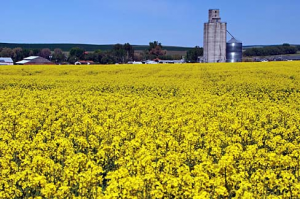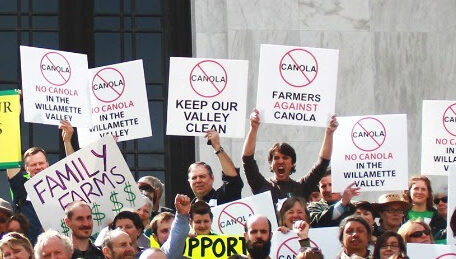SB 789 (Maintain the Willamette Protected District) – PASSED with compromise
This bill to maintain the Willamette Valley Protected District and limit Canola production to preserve our specialty seed growing ability is crucial to the existence of our brassica seed industry in Oregon. Although this has been settled science and extended twice before, some politically connected canola farmers were able to drum up opposition and turn this issue into a party line vote. The bill was originally written to make the protected district permanent, but as it was included in the deal to bring Republicans back to the capitol, it was amended to a one year sunset and a workgroup to explore other solutions.
The Oregon Organic Coalition, Friends of Family Farmers, and the Willamette Valley Specialty Seed Association are in favor of the continued protections for seed growers afforded by the -1 amendment (which was adopted and passed, see the text here) and are interested in further research and new policy development through the work group. We stand ready to contribute to a science based discussion about the coexistence of canola and specialty seed production in the Willamette Valley. It is crucial that this work group represent balanced perspectives from both industries and as such our coalition pledges to come to the table with lawmakers on all sides of this discussion to protect the unique agricultural landscape of the Willamette Valley. The specialty seed farmers of Oregon are grateful for your consideration and leaving protections in place while further changes are discussed. We appreciate the hard work of legislators on this issue during such a tumultuous session.
We will be monitoring the work group closely, arranging farm tours for legislators to visit specialty seed growers and keeping up our efforts to educate new members on this niche issue during the interim. We are looking forward to finding a solution that preserves this special industry and respects the needs of small farms.
For more information on SB 789:
- Visit www.protectwhatsgood.com
- Watch this short explainer video
- Read this Letter to the Editor
- Read this Op Ed
- See these Talking points
- Read Highland Economic’s assessment of the impact canola could have on the brassica seed industry.
- KEY MESSAGES:
- The Willamette Valley is one of the last remaining regions in the world suitable for large-scale vegetable specialty seed production, including the majority of the world’s brassica seed supply. Over 90% of some brassica seed varieties, like cabbage, are grown in the Willamette Valley. Increased and unpinned canola acreage could irreversibly damage this industry.
- A recent assessment by non-partisan firm Highland Economics was unambiguous that the high-value brassica seed industry is worth far more to Oregon than low-value canola in terms of revenue and job creation. The assessment unequivocally underscores the need for permanent protections and also cites several canola alternatives that do not pose the same threat.
- This economic assessment differs from past studies as it takes cross-contamination and economic harm into account, not just pest and disease pressures.
- In Oregon, we protect what’s good, so it can keep being good – providing jobs, keeping the soil healthy, and ensuring a sustainable food future for Oregon and beyond.
- Like the incentives to build cars in Detroit or grow oranges in Florida, protecting key industries is a cornerstone of smart economic policy. In the Willamette, that means protecting land for high-value seed growing, and for the many crops that don’t interfere with high-value seed growing, like grapes and grasses.
- Rapeseed/canola, a low-value crop, endangers our valuable seed crop industry, and should be grown elsewhere. Rapeseed/canola cultivation can happen in many agricultural areas of Oregon where it will not endanger high-value seed crops with the risk of genetically engineered cross-contamination, and pest and disease spread.
- Oilseed alternatives to rapeseed are available. These oilseed crops provide many of the same benefits to farmers and could be grown more widely with far less danger to speciality seed crops. These include flax, safflower, sunflower, yellow mustard, and camelina.
- For many years, protections for high-value seed crops have ensured stability and profitability for Oregon seed growers, and access to the profitable global market for our seed sellers. Rolling them back is bad for business, and creates an unpredictable, unstable environment for seed growing.
- A few politically connected farmers are pushing to grow rapeseed/canola in the Willamette protected zone. But we should not open Pandora’s Box: once cross-contamination and pest spread happens, it cannot be reversed. The risk to our seed industry is just too great to gamble with. Once contamination happens, our seed cannot be sold on the global market, and we lose precious seed varieties that have been cultivated for generations to ensure food security.
- We are at a pivot point with protecting the Willamette for this key industry, and for the biodiverse seed varieties that growers all over the world depend on. We must extend the protections indefinitely and protect what’s good. There is simply too much to lose. Here, as with so many public policies, an ounce of prevention is worth a pound of cure.
- SB789 is a wise extension of the current policy, enshrining the current protections and collaborative system in state law.

Important new study about the potential economic impacts of lifting the canola ban:
The Willamette Valley is one of the vegetable seed capitals of the world, a very special place for growing high-value seeds, and an economic powerhouse for our state. Currently, cultivation of rapeseed/canola, a low-value oilseed that can irreversibly undermine the vegetable seed industry through cross-contamination and increased pest and disease pressure, is capped at 500 acres in the Willamette Valley Protected District. However, this cap is set to expire at the end of June and a few politically-connected farmers are pushing to grow more rapeseed/canola in the protected district. This session, the Oregon legislature can and should make the Protected District permanent and thus ensure that this vibrant part of our farm economy remains strong for generations to come through SB789.-
Brassica seed production, the seed most at risk from rapeseed/canola, produces average profits of $1400 per acre for conventional, and $32,000 per acre for organically grown seed. In contrast, rapeseed/canola produces profits of only $190 per acre.
-
If, as is likely, rapeseed/canola were to eliminate brassica seed growing (setting aside the impacts to seed producers’ investments and other crops) a loss of approximately $15M in production value, and $9.2M in direct and indirect labor income, would ensue. These figures do not include additional substantial losses from the Valley-based seed processing companies.
-
Other oilseed crops such as flax, sunflower, safflower, yellow mustard and camelina do not threaten specialty seed crops to the degree that canola does, and can be grown in the protected districts.

